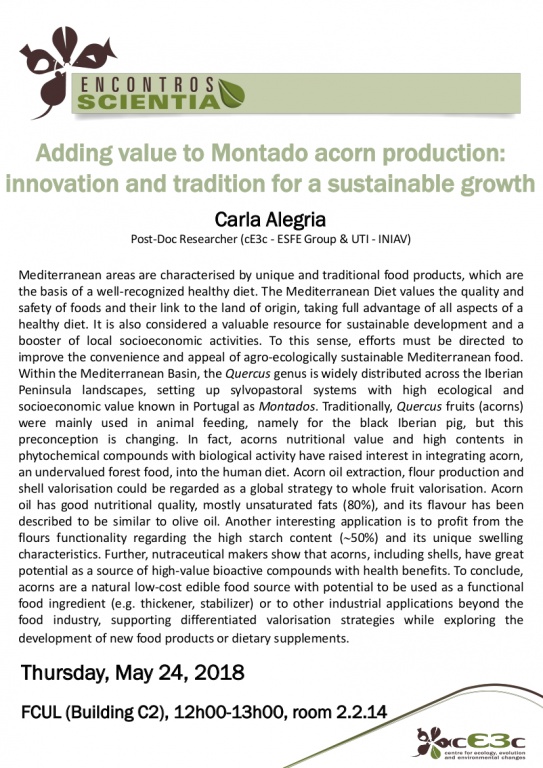Adding value to Montado acorn production: innovation and tradition for a sustainable growth
Carla Alegria
Post-Doc Researcher (cE3c - ESFE Group & UTI - INIAV)
Mediterranean areas are characterised by unique and traditional food products, which are the basis of a well-recognized healthy diet. The Mediterranean Diet values the quality and safety of foods and their link to the land of origin, taking full advantage of all aspects of a healthy diet. It is also considered a valuable resource for sustainable development and a booster of local socioeconomic activities. To this sense, efforts must be directed to improve the convenience and appeal of agro-ecologically sustainable Mediterranean food. Within the Mediterranean Basin, the Quercus genus is widely distributed across the Iberian Peninsula landscapes, setting up sylvopastoral systems with high ecological and socioeconomic value known in Portugal as Montados. Traditionally, Quercus fruits (acorns) were mainly used in animal feeding, namely for the black Iberian pig, but this preconception is changing. In fact, acorns nutritional value and high contents in phytochemical compounds with biological activity have raised interest in integrating acorn, an undervalued forest food, into the human diet. Acorn oil extraction, flour production and shell valorisation could be regarded as a global strategy to whole fruit valorisation. Acorn oil has good nutritional quality, mostly unsaturated fats (80%), and its flavour has been described to be similar to olive oil. Another interesting application is to profit from the flours functionality regarding the high starch content (~50%) and its unique swelling characteristics. Further, nutraceutical makers show that acorns, including shells, have great potential as a source of high-value bioactive compounds with health benefits. To conclude, acorns are a natural low-cost edible food source with potential to be used as a functional food ingredient (e.g. thickener, stabilizer) or to other industrial applications beyond the food industry, supporting differentiated valorisation strategies while exploring the development of new food products or dietary supplements.
Thursday, May 14, 2018
FCUL (Building C2), 12h00-13h00, room 2.2.14

